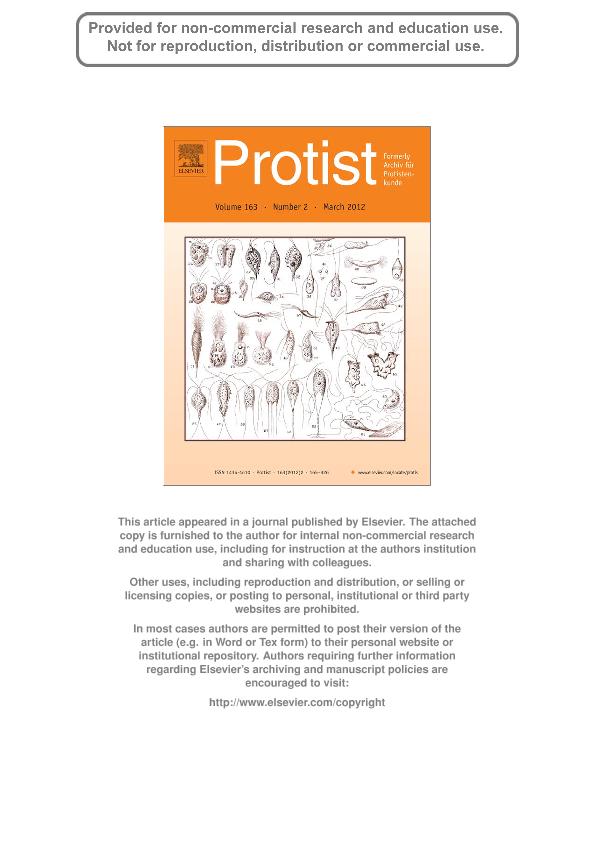Mostrar el registro sencillo del ítem
dc.contributor.author
Bosco, Maria Belen

dc.contributor.author
Aleanzi, Mabel Cristina

dc.contributor.author
Iglesias, Alberto Alvaro

dc.date.available
2019-09-29T16:47:44Z
dc.date.issued
2012-03
dc.identifier.citation
Bosco, Maria Belen; Aleanzi, Mabel Cristina; Iglesias, Alberto Alvaro; Plastidic Phosphoglycerate Kinase from Phaeodactylum tricornutum: On the Critical Role of Cysteine Residues for the Enzyme Function; Elsevier Gmbh; Protist; 163; 2; 3-2012; 188-203
dc.identifier.issn
1434-4610
dc.identifier.uri
http://hdl.handle.net/11336/84786
dc.description.abstract
Chloroplastidic phosphoglycerate kinase (PGKase) plays a key role in photosynthetic organisms, catalyzing a key step in the Calvin cycle. We performed the molecular cloning of the gene encoding chloroplastidic PGKase-1 in the diatom Phaeodactylum tricornutum. The recombinant enzyme was expressed in Escherichia coli, purified and characterized. Afterward, it showed similar kinetic properties than the enzyme studied from other organisms, although the diatom enzyme displayed distinctive responses to sulfhydryl reagents. The activity of the enzyme was found to be dependent on the redox status in the environment, determined by different compounds, including some of physiological function. Treatment with oxidant agents, such as diamide, hydrogen peroxide, glutathione and sodium nitroprusside resulted in enzyme inhibition. Recovery of activity was possible by subsequent incubation with reducing reagents such as dithiothreitol and thioredoxins (from E. coli and P. tricornutum). We determined two midpoint potentials of different regulatory redox centers, both values indicating that PGKase-1 might be sensitive to changes in the intracellular redox environment. The role of all the six Cys residues found in the diatom enzyme was analyzed by molecular modeling and site-directed mutagenesis. Results suggest key regulatory properties for P. tricornutum PGKase-1, which could be relevant for the functioning of photosynthetic carbon metabolism in diatoms.
dc.format
application/pdf
dc.language.iso
eng
dc.publisher
Elsevier Gmbh

dc.rights
info:eu-repo/semantics/openAccess
dc.rights.uri
https://creativecommons.org/licenses/by-nc-sa/2.5/ar/
dc.subject
PHAEODACTYLUM TRICORNUTUM
dc.subject
PHOSPHOGLYCERATE KINASE
dc.subject
REDOX REGULATION.
dc.subject.classification
Bioquímica y Biología Molecular

dc.subject.classification
Ciencias Biológicas

dc.subject.classification
CIENCIAS NATURALES Y EXACTAS

dc.title
Plastidic Phosphoglycerate Kinase from Phaeodactylum tricornutum: On the Critical Role of Cysteine Residues for the Enzyme Function
dc.type
info:eu-repo/semantics/article
dc.type
info:ar-repo/semantics/artículo
dc.type
info:eu-repo/semantics/publishedVersion
dc.date.updated
2019-09-27T14:15:09Z
dc.journal.volume
163
dc.journal.number
2
dc.journal.pagination
188-203
dc.journal.pais
Alemania

dc.journal.ciudad
Jena
dc.description.fil
Fil: Bosco, Maria Belen. Consejo Nacional de Investigaciones Científicas y Técnicas. Centro Científico Tecnológico Conicet - Santa Fe. Instituto de Agrobiotecnología del Litoral. Universidad Nacional del Litoral. Instituto de Agrobiotecnología del Litoral; Argentina
dc.description.fil
Fil: Aleanzi, Mabel Cristina. Consejo Nacional de Investigaciones Científicas y Técnicas. Centro Científico Tecnológico Conicet - Santa Fe. Instituto de Agrobiotecnología del Litoral. Universidad Nacional del Litoral. Instituto de Agrobiotecnología del Litoral; Argentina
dc.description.fil
Fil: Iglesias, Alberto Alvaro. Consejo Nacional de Investigaciones Científicas y Técnicas. Centro Científico Tecnológico Conicet - Santa Fe. Instituto de Agrobiotecnología del Litoral. Universidad Nacional del Litoral. Instituto de Agrobiotecnología del Litoral; Argentina
dc.journal.title
Protist

dc.relation.alternativeid
info:eu-repo/semantics/altIdentifier/doi/http://dx.doi.org.proxy1.cl.msu.edu/10.1016/j.protis.2011.07.001
dc.relation.alternativeid
info:eu-repo/semantics/altIdentifier/doi/http://dx.doi.org/10.1016/j.protis.2011.07.001
Archivos asociados
